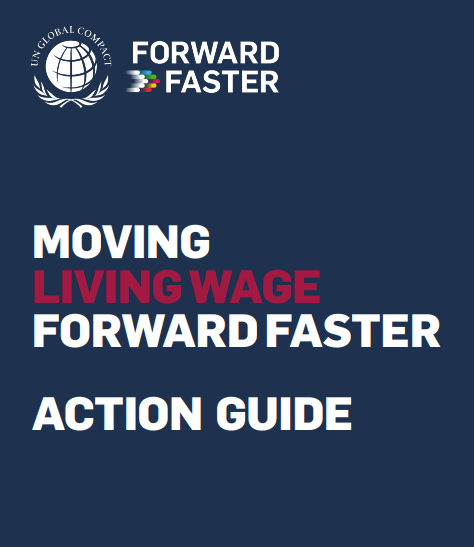Unilever’s Commitment to Living Wages: A Path Towards Business Resilience and Growth
Start Reading

1. Company at a Glance
Unilever has implemented a comprehensive strategy to improve livelihoods by advancing living wages throughout its global value chain. The company believes that a living wage is a fundamental human right, which also delivers business benefits, enhancing productivity and supply chain resilience.
Fast Moving Consumer Goods (FMCG)
Industry
Over 100 years ago
Founded
United Kingdom
Headquarters
Around 120,000 worldwide
Number of Employees:
2. The Challenge
Addressing Inequality for Sustainable Business Growth
For Unilever, inequality is a systemic risk that affects both society and business, posing a direct threat to business stability, supply chain resilience, and productivity. In response, the company is actively working to tackle inequality to support sustainable growth and build trust with employees, consumers, retailers, suppliers, and investors.
As part of these efforts, Unilever has paid a living wage to all its direct employees since 2020 and has set a future mandatory requirement for its direct suppliers to adopt the living wage by 2030.
3. The Action
Implementing a Scalable Living Wage Strategy
Living Wage Framework
Unilever published its Framework for Fair Compensation in 2014. The company identified a living wage benchmark provider with data for all operating countries, conducted a global wage gap analysis for all employees, and developed a plan to close those gaps. It took nearly six years to achieve this, and in 2021, Unilever was accredited by Fair Wage Network as a global Living Wage Employer.
Supply Chain Expansion
In 2021, Unilever expanded its commitment to its supply chain. Its current target is that by 2026, 50% of procurement spend will be with suppliers who’ve signed their Living Wage Promise. In addition, as part of their Responsible Partner Policy, the company has set a future mandatory requirement for direct suppliers to pay a living wage to their employees by 2030.
Support for Suppliers
To assist suppliers on their journey in 2024, Unilever launched a capability-building programme in partnership with IDH - the Sustainable Trade Initiative, to support them in this process. This includes providing the tools and resources needed for suppliers to get started, and measure their living wage gaps.
Public Advocacy
Unilever also drives advocacy efforts to encourage more companies to adopt ambitious living wage commitments, and to promote enabling public policies to create a level playing field. The company collaborates with organizations such as the UN Global Compact, the World Business Council for Sustainable Development and the International Labor Organization (ILO) to push for the global adoption of living wages.
External Partnerships
Unilever partnered with 11 companies, including IKEA, L’Oréal, and H&M, to invest in the WageIndicator Foundation to make wage data freely available in over 170 countries, providing suppliers with a valuable benchmarking tool while equipping workers and trade unions with tangible information with which to negotiate for a living wage.
Impact Studies
Unilever has conducted impact studies with partners such as Harvard, EY and 60 Decibels to strengthen the business case and showcase the benefits of living wage implementation. Research shows that living wages improve worker satisfaction and productivity, reduce staff turnover and associated costs, and, in some cases, expand consumer markets by increasing people’s purchasing power.
4. Overcoming Barriers
Competitive Disadvantage
A key challenge is that if Unilever is the only buyer requiring suppliers to pay a living wage, it risks being at a competitive disadvantage. To address this risk, the company has focused on demonstrating the business benefits of living wages and advocating for widespread adoption across industries as well as advocating for governments to level the playing field by pushing for minimum wages to reflect the living wage.
Supplier Awareness
Baseline surveys revealed that many suppliers have limited awareness of what a living wage is and struggle with how to get started. Unilever addressed this by developing and providing tools and resources to help them assess and close wage gaps. These are at the core of their capability building programme and include a living wage playbook, access to public living wage data and expert consultations with IDH
Lack of Standardized Data
One of the main barriers to global progress on living wages has been the lack of consensus on how they are defined and operationalized. To tackle this, Unilever worked with a coalition of companies to lobby the ILO to establish this definition and guidance, which it published in 2024.
5. Impacts & Results
Unilever achieved full living wage compliance for its employees by 2020.
As of 2024, 32% of Unilever's procurement spend came from suppliers who has signed the Living Wage Promise.
Nearly all third party factories that exclusively produce goods for Unilever have a contractual requirement to pay a living wage.
Impact studies have revealed improvements in worker satisfaction, retention and productivity.
6. Key Lessons Learned
Prioritize progress over perfection
Small steps towards a larger goal are essential in addressing systemic issues.
Credibility and trust
Engaging suppliers on living wages requires credibility and trust. Unilever’s own experience in maintaining living wage compliance provides valuable lessons to share with suppliers.
Collaboration is essential
Partnerships with NGOs, suppliers, and governments are vital to creating an enabling environment for change.
Transparency drives change
Publicly available data helps benchmark progress and holds companies accountable.
Cement the business case
Measuring the impacts of paying a living wage and building on the business case are key to maintaining commitment and furthering progress on living wage.
"A living wage is not only a human right but also has commercial benefits – including productivity gains, attracting and retaining talent, supply chain resilience, maintaining reputation, and growing consumer markets.”
Matteo Squire, Global Sustainability Manager
7. Resources
Unilever has been a committed participant in several UN Global Compact initiatives:
Signatory of the Forward Faster initiative in Living Wage targets
Member of the Think Lab on Just Transition
Signatory of the CEO Water Mandate
Signatory of the CEO Statement on Human Rights
Recommended UN Global Compact Resources


